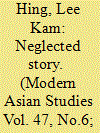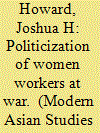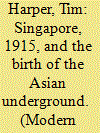|
|
|
Sort Order |
|
|
|
Items / Page
|
|
|
|
|
|
|
| Srl | Item |
| 1 |
ID:
126150


|
|
|
|
|
| Publication |
2013.
|
| Summary/Abstract |
This paper looks at the establishment of experimental winter overland postal routes in the late 1870s and 1880s, which eventually led to the creation of the Great Qing Imperial Post Office in 1896. The history of this experiment sheds much light on important issues in the establishment of what was to become the country's most crucial information-bearing network, in particular those related to collaboration and negotiation between foreign and Chinese officials, and those between local interests and the central authorities. It also explores how foreign processes and management had to be adapted in order to function in a Chinese context.
In March 1878, Robert Hart, inspector general of the Chinese Maritime Customs Service, instructed Gustav Detring, commissioner of Tianjin Port, to investigate the possibility of introducing overland public postal routes in China, beginning with Beijing to Tianijn, Niuzhuang, Yantai, and then to Zhenjiang, a treaty port on the lower Yangtze River.
The three main challenges involved were: to establish a reliable workforce, to design appropriate routes, and to win the cooperation of local governing officials. Although the winter service was initiated on time, problems repeatedly arose from each one of these challenges.
|
|
|
|
|
|
|
|
|
|
|
|
|
|
|
|
| 2 |
ID:
126156


|
|
|
|
|
| Publication |
2013.
|
| Summary/Abstract |
In May 1949 the Chinese Communist Party seized Shanghai. Rather than being elated at the prospect of harnessing the economic power of China's largest city to complete the revolution, the Communists approached it cautiously. How would the Chinese Communist Party set about transforming this free-wheeling port city with a 'semi-colonial' past into an orderly and socialist city? How would it balance ideology and pragmatism in reshaping Shanghai? This paper uses the takeover of two British companies as case studies to explore these issues at the ground level. It is argued that the means by which these companies were transformed tell us much about the Party and its state-building policies. When cadres entered foreign companies, their priority was not radical change and anti-imperialism, but rather fostering a sense of stability and unity to avoid disrupting production. Their gradual approach was due in large part to the Party's awareness of its own limited skills, resources and manpower, but also to its leaders and cadres recognizing that before they could remake Shanghai anew they had first to deal with the material and human legacies of the past.
|
|
|
|
|
|
|
|
|
|
|
|
|
|
|
|
| 3 |
ID:
126160


|
|
|
|
|
| Publication |
2013.
|
| Summary/Abstract |
Rising Uyghur ethnic consciousness in the post-1978 era is believed to cause tense Uyghur-Han relations and conflicts in Xinjiang. There are different accounts linking rising Uyghur consciousness with variables such as Han migration into Xinjiang, ethnic inequalities, Uyghur language, and Islamic religiosity. Yet there is no concrete effort to summarize, elaborate, and verify these accounts. Nor is there a quantitative study of the levels of Uyghur ethnic consciousness in Xinjiang. Using data from a survey (N = 799) conducted in Ürümchi in 2007, this paper shows a high level of ethnic consciousness among Uyghurs. It also shows that Uyghur consciousness is based more on cultural and psychological properties than on instrumental sentiments.
|
|
|
|
|
|
|
|
|
|
|
|
|
|
|
|
| 4 |
ID:
126153


|
|
|
|
|
| Publication |
2013.
|
| Summary/Abstract |
The Mantetsu Employees' Association, founded in 1926 by a group of elite university-educated employees of the South Manchuria Railway Company, was an organization of unprecedented scope and vision which provided for the development of a limited form of self-government by the Japanese in the Kwantung Leasehold and Rail Zone during Japan's occupation of northeast China. Its founding principles resembled the ideological tenets of the metropole's movement of Taisho Democracy which had since the post-Russo-Japanese War energized supporters of widened popular access to the job of national governance. This paper traces how the Mantetsu Employees' Association reflected the political zeitgeist of post World War I metropolitan society whilst simultaneously developing in response to heightened Chinese nationalism in the northeast throughout the 1920s. It shows how the Association encompassed a wide range of employee ambitions-from increased involvement in imperial decision-making to labour advocacy on behalf of the Company's lowest-ranking Japanese workers to a critique of colonial policy as dictated by Tokyo's political parties. The paper introduces key Association players and their ideas as a means of questioning the nature of democracy in an imperial setting.
|
|
|
|
|
|
|
|
|
|
|
|
|
|
|
|
| 5 |
ID:
126157


|
|
|
|
|
| Publication |
2013.
|
| Summary/Abstract |
During the Malayan Emergency (1948-1960), the colonial authorities resettled an estimated half a million rural dwellers, mainly Chinese, from the fringe of the jungle, to cut them off from contact with armed members of the Malayan Communist Party. The re-location led to political alienation among many resettled in the nearly 500 New Villages. Winning their support against the insurgency therefore was urgent. At this juncture, foreign missionaries were forced to leave China following the communist takeover in October 1949. Many of these missionaries were Chinese-speaking with medical or teaching experience. The High Commissioner of Malaya, Sir Henry Gurney, and his successor, Sir Gerald Templer, invited these and other missionaries to serve in the New Villages. This paper looks at colonial initiatives and mission response amidst the dynamics of domestic politics and a changing international balance of power in the region.
|
|
|
|
|
|
|
|
|
|
|
|
|
|
|
|
| 6 |
ID:
126154


|
|
|
|
|
| Publication |
2013.
|
| Summary/Abstract |
This paper offers a fresh anarchist history of modern rural experience at the heart of Japan's modernization project in Hokkaido. The rationalization of agricultural methods and the establishment of big farms in Hokkaido worked by tenant farmers served the dual purpose of both colonizing and modernizing Japan's northern frontier. Against the idea of progress imbued in that colonial project, the anarchist and celebrity writer, Arishima Takeo, liberated his tenant farmers by dissolving his tenant farm in Niseko in 1922. The farmers were made the new cooperative owners. Members of the farm, made famous during widespread tenant-farmer disputes, believed they stood at the heart of progress. 'Sogo fujo' (mutual aid) was viewed as an ethic for social transformation, democracy and elimination of hierarchy that linked the farmers with the wider world. It was the farmers' consciousness of working in a new era, better than ever before, that made them modern. Their community offers us a case study of the imagination and experience of modern temporality amongst the most unlikely subjects of the modern, ordinary agricultural laborers in rural Asia in the early twentieth century. This anarchist history challenges the conceptual framework that has categorized rural Japan as the seat of conservative politics, nativism and traditionalism, and the antithesis of modernity.
|
|
|
|
|
|
|
|
|
|
|
|
|
|
|
|
| 7 |
ID:
126155


|
|
|
|
|
| Publication |
2013.
|
| Summary/Abstract |
Building on recent scholarship that highlights social change caused by the Anti-Japanese War, this paper traces the politicization of women working in the cotton mills of Chongqing, the Nationalist wartime capital. Upon joining the workforce in the late 1930s, most cotton mill hands were young, uneducated women expected to endure hard work and remain physically confined to the factories. By 1945, women workers were at the forefront of a militant labour movement, writing manifestoes and petitioning government officials. This process of politicization stemmed from their decision to work in factories, which breached societal norms, and their experience of disciplined labour regimes and brutal working conditions, which fostered an incipient class-consciousness. Moreover, Nationalist-sponsored factory education campaigns had the unintended effect of leading women to challenge class exploitation and sexual discrimination. Their participation in the labour movement, which was fuelled by their struggle for economic justice and desire for higher social status, used both legal forms- especially petitions and letters to the press couched in the wartime nationalist rhetoric of shared sacrifice-and extralegal means, namely class violence. The paper concludes that the social changes and conflict that accompanied women's wartime work helped prepare the terrain for Communist rule.
|
|
|
|
|
|
|
|
|
|
|
|
|
|
|
|
| 8 |
ID:
126158


|
|
|
|
|
| Publication |
2013.
|
| Summary/Abstract |
The Henan famine of 1942 occurred during the middle of the Sino-Japanese war, in a province that was divided between Japanese, Nationalist and Communist political control. Partly due to this wartime context, existing accounts of the famine rely almost exclusively on eyewitness reports. This paper presents a range of statistical sources on the famine, including weather records, contemporary economic surveys and population censuses. These statistical sources allow similarities to be drawn between the Henan famine and other famines that occurred during the Second World War, such as in Bengal, when the combination of bad weather, war-induced disruptions to food markets, and the relegation of famine relief to the war effort, brought great hardship to civilians living near the war front.
|
|
|
|
|
|
|
|
|
|
|
|
|
|
|
|
| 9 |
ID:
126152


|
|
|
|
|
| Publication |
2013.
|
| Summary/Abstract |
This paper examines the 1915 Singapore Mutiny within the context of border-crossing patriotic and anarchist movements in the early twentieth century world. It traces some of the continuities and discontinuities with later revolutionary movements in Asia, especially in terms of networks and the sites of their interactions. Through this, it reflects on the meaning of the 'transnational' at this moment in Asian history.
|
|
|
|
|
|
|
|
|
|
|
|
|
|
|
|
|
|
|
|
|